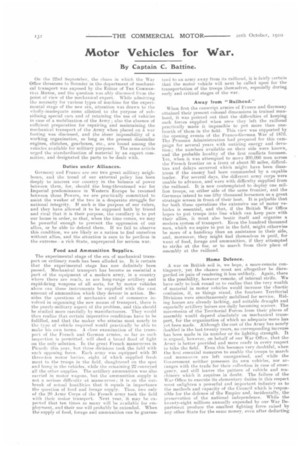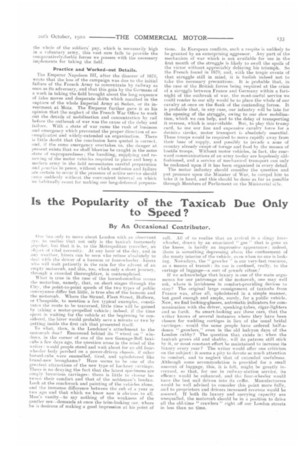Motor Vehicles for War.
Page 4

Page 5

If you've noticed an error in this article please click here to report it so we can fix it.
By Captain C. Battine.
On the 22nd September, the chaos in which the War Office threatens to flounder in the department of mechanical transport was exposed by the Editor of THE ConMEit
CIL and the question was ably discussed from the point of view of the mechanical expert. While admitting the necessity for various types of machine for the experimental stage of the new era, attention was drawn to the wholly-inadequate sums allotted to the purpose of subsidizing special cars and of retaining the use of vehicles in case of a mobilization of the Army; also the absence of sufficient preparation for repairing and maintaining the mechanical transport of the Army when placed on a war footing was discussed, and the sheer impossibility of a working organization, so long as the present dissimilar engines, clutches, gearboxes, etc., are found among the vehicles available for military purposes. The same article urged the standardization of material by an expert committee, and designated the parts to be dealt with.
Duties undar Alliances.
Germany and France are our two great military neighbours, and the trend of our external policy has been deeply to interest our country in the balance of power between them, for, should the long-threatened war for Imperial predominance in Western Europe be resumed between these Powers, we are practically committed to assist the weaker of the two in a desperate struggle for national integrity. If such is the purpose of our rulers, and they have allowed it to be supposed both by friend and rival that it is their purpose, the corollary is to put our house in order, so that, when the time comes, we may be powerful enough to prevent the oppression of our allies, or be able to defend them. If we fail to observe this condition, we are likely as a nation to find ourselves without allies, and the situation is sure to be perilous in the extremea rich State, unprepared for serious war.
Food and Ammunition Supplies.
The experimental stage of the era of mechanical transport on ordinary roads has been alluded to. It is certain that the experimental stage has now definitely been passed. Mechanical transport has become as essential a part of the equipment of a modern army, in a country where there are roads, as are long-range artillery and rapid-firing weapons of all sorts, for by motor vehicles alone can these instruments be supplied with the vast amount of ammunition which they devour in action. Besides the questions of mechanics and of commerce involved in organizing the new means of transport, there is the purely-military aspect of the problem, and this should be studied more carefully by manufacturers. They would then realize that certain imperative conditions have to be fulfilled, and that the maker who attains most nearly to the type of vehicle required wmild practically be able to make his own terms. A close examination of the transport of the French and German armies, so far as such inspection is permitted, will shed a broad flood of light on the only solution. In the great French manceuvres in Picardy this year, but three divisions took the field with each opposing force. Each army was equipped with no three-ton motor lorries, eight of which supplied fresh meat to the troops in the field, slaughtered on the spot and hum, in the vehicles. while the remainirg 22 conveyed all the other supplies. The artillery ammunition was also carried in motor wagons, but the ammunition supply is not a serious difficulty -at manceuvres it is on the outbreak of actual hostilities that it equals in importance the question of food and forage supply. Thus, two only of the 20 Army Corps of the French army tank the field with their motor transport. Next year, it may be expected that ten times as many will be available for employment, and their use will probably be extended. When the supply of food, forage and ammunition can be guaran
teed to an army away from its railhead, it, is fairly certain that the motor vehicle will next be called upon for the transportation of the troops themselves, especially during early and critical stages of the war.
Away from "Railhead."
When first the conscript armies of France and Germany attained their present colossal dimensions in trained manhood, it was pointed out that the difficulties of keeping such forces supplied when once they left the railhead practically made it impossible to put more than onefourth of them in the field. This view was supported by the opening events of the Franco-German War of 1870. The Prussian Administration had prepared for this campaign for several years with untiring energy and devotion; the numbers available on their side were known, and the probable locality of the first conflicts foreseen. Yet, wheu it was attempted to move 300,000 men across the French frontier on a front of about 30 miles, difficulties and delays occurred which might have been disastrous if the enemy had been commanded by a capable leader. For several days, the different army corps were unable to advance, and were with difficulty supplied from the railhead. It is now contemplated to deploy one million troops, on either side of the same frontier, and the Germans intend to use fifty thousand horsemen as a great strategic screen in front of their host. It is palpable that for both these operations the extensive use of motor vehicles is essential, and that, if the British War Office hopes to put, troops into line which can keep pace with their allies, it must also bestir itself and organize a modern system of transport. Even the hundred thousand men, which we aspire to put in the field, might otherwise be more of a handicap than an assistance to their side, and, moreover, they might find themselves in peril, for want of food, forage and ammunition, if they attempted to strike at the foe, or to march from their place of assembly at the railhead.
Home Defence.
A war on British soil is, we hope, a more-remote contingency, yet the chance must not altogether be disregarded on pain of rendering it less unlikely. Again, there is the possibility, however remote, of internal strife. We have only to look round us to realize that the very wealth of material in motor vehicles would increase the chaotic confusion, if, as things stand, the fourteen Territorial Divisions were simultaneously mobilized for service. Riding horses are already lacking, and suitable draught and especially artillery horses are daily becoming scarcer. The movements of the Territorial Forces from their places of assembly would depend absolutely on mechanical transport, for the organization of which no adequate move has yet been made. Although the cost of the Army has nearly doubled in the last twenty years, no corresponding increase has been made in its number or its fighting strength. It is argued, however, on behalf of our War Office, that the Army is better provided and more ready in every respect to take the field. Even this becomes very doubtful, when the first essential measures to enable the troops to march and manoeuvre are left unorganized, and while the Government neither possesses its own vehicles, nor arranges with the trade for their collection in case of emergency, and still leaves the pattern of vehicle and machinery which it requires in doubt. The failure of the War Office to execute its elementary duties in this respect must enlighten a powerful and important industry as to the methods and capacity of the Council which is responsible for the defence of the Empire and, incidentally, the preservation of the national independence. While the twenty-eight millions annually expended by our War Department produce the smallest fighting force raised by any other State for the same money, even after deducting the whole of the soldiers pay, which is necessarily high in a voluntary army, this vast sum fails to provide the comparatively-feeble forces we possess with the necessary implements for taking the field.
Practice and Worked-out Details. The Emperor Napoleon 111, after the disaster of 1870, wrote that the loss of the campaign was due to the initial failure of the French Army to concentrate by railway as soon as its adversary, and that this gain by the Germans of a week in taking the field brought about the long sequence of false moves and desperate shifts which resulted in the capture of the whole Imperial Army at Sedan, or its in-. vestment at Metz. The Emperor further gave it as his opinion that the neglect of the French War Office to work out the details of mobilization and concentration by rail before the outbreak of war was the cause of the delay and failure, With a state of war came the rush of business and emergency which prevented the proper direction of socomplisated and widely-extended an organization. There is little doubt that the conclusion here quoted is correct, and. if the same emergency overtakes us, the danger at present exists that we shall likewise be caught in the same 6ta te of unpreparedness; the handling, supplying and rt. of the motor vehicles required to plate and keep a modern army in the field necessitates careful preparation and iestctice in peace, without which confusion and failure are certain to occur if the pressure of active service should some soddenly without the convenient interval on which we habitually count for making our long-deferred prepare
thins. In European conflicts, such a respite is unlikely to be granted by an enterprising aggressor. Any part of the mechanism of war which is not available for use in the first month of the struggle is likely to swell the spoils of the victor without appreciably delaying his triumph. So the French found in 1870, and, with the tragic events of that struggle still in mind, it is foolish indeed not to take the necessary precautions. It is probable that, in the case of the British forces being required at the crisis of a struggle between France and Germany within a fortnight of the outbreak of war, the most-useful service we could render to our ally would be to place the whole of our cavalry at once on the flank of the contending forces. It is probable that, in any case, our infantry will be late for the opening of the struggle, owing to our slow mobilization, which we can help, and to the delay of transporting it oversell, which is unavoidable. But, to play this trump card, to use our fine and expensive cavalry force for a decisive stroke, motor transport is absolutely essential. These troops would be required to move rapidly away from their base of supply, and possibly to invade a zone of country already swept of forage and food by the masses of hostile troops. 'Without motor vehicles, in fact, the rearward communications of an army to-day are hopelessly oldfashioned, and a service of mechanical transport can only be reckoned upon if it has been organized in every detail. The motor industry should consider the question and put pressure upon the Minister of War, to compel him to take it in hand, and this should be done as far as possible through Members of Parliament on the Ministerial side.




















